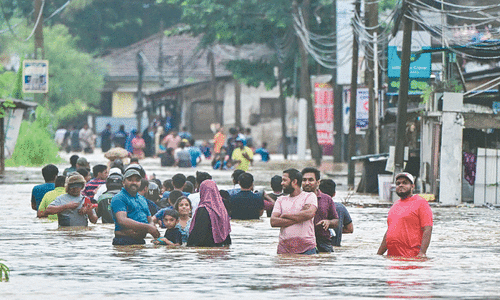MOSCOW: Three special forces troops, Kalashnikov rifles draped across their chests, stood guard outside the courtroom. Inside, an equally ominous pitbull kept watch from in front of the judge's desk as journalists piled into a shabby wooden room inside Moscow’s notorious Khamovnichesky court.
There were no murderers inside, no terrorists, not even someone accused of grand-scale theft. Instead, the courtroom's glass cage, where defendants are required to sit out their trial, held three young women — the jailed members of feminist punk band Pussy Riot, who have thrust Vladimir Putin's crackdown on dissent into the spotlight like never before.
Nearly five months after they were detained for performing an anti-Putin “punk prayer” inside Moscow’s main cathedral, Maria Alyokhina, Nadezhda Tolokonnikova and Yekaterina Samutsevich went on trial on Monday.
They could be jailed for up to seven years if found guilty of hooliganism motivated by religious hatred. They deny the charge.
The glass cage holding Pussy Riot — dubbed “the aquarium” was chained shut, three sets of black handcuffs hanging linked from the lock. Alyokhina, 24, Tolokonnikova, 22, and Samutsevich, 29, sat calmly, with their arms crossed.as the trial got under way, 50 minutes late because of the crush of journalists outside.
Across from the cage, sat seven men and two women — the nine people who were inside Moscow's Cathedral of Christ the Saviour, mainly working as guards, when Pussy Riot stormed the altar in late February, clad in their trademark bright clothes and balaclavas, and began screaming the words: “Virgin Mary, throw Putin out!”
They have been mortally insulted, the prosecutor said. And they “fear for their health and safety”, which is why, he argued, the court’s rare decision to livestream the proceedings on its website should be shut down. Judge Marina Syrova agreed.Violetta Volkova, defending the three women, read out handwritten statements, explicit condemnations of Putin that large numbers of Muscovites have only recently express openly as their protest movement took hold after he announced he was returning to the presidency.
They have never been said in a court of law before — at least not one being so closely watched in Russia and abroad. “Our criminal case is political censorship from the side of the authorities, the start of a campaign of authoritarian, repressive measures aimed at lowering the level of political activism and provoking a feeling of fear among citizens who hold opposition views,” Samutsevich's letter said.
By arrangement with the Guardian











































Dear visitor, the comments section is undergoing an overhaul and will return soon.